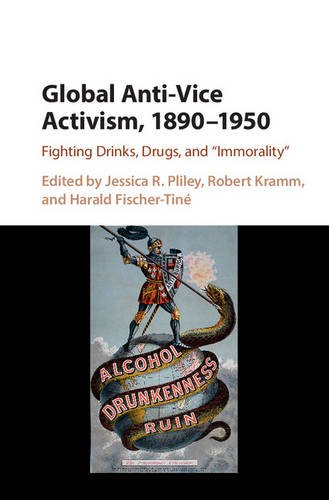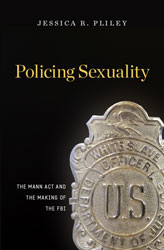
Global Anti-Vice Activism, 1890 – 1950: Fighting Drinks, Drugs, and “Immorality” (Cambridge: Cambridge University Press, 2016).
Vice was one of the primary shared interests of the global community at the turn of the twentieth century. Anti-vice activists worked to combat noxious substances such as alcohol, drugs and cigarettes, and “immoral” sexual activities such as prostitution. Nearly all of these activists approached the issue of vice by expressing worries about the body, its physical health, and functionality. By situating anti-vice politics in their broader historical contexts, Global Anti-Vice Activism, 1890 – 1950 sheds fresh light on the initiatives of various actors, organizations and institutions which have previously been treated primarily within national and regional boundaries. Looking at anti-vice policy from both social and cultural historical perspectives, it illuminates the centrality of regulating vice in imperial and national modernization projects. The contributors argue that vice and vice regulation constitute an ideal topic for global history, because they bridge the gap between discourse and practice, and state and civil society.In addition to being available for purchase at the Cambridge UP website, you can also find it available at Amazon.com.

Policing Sexuality: The Mann Act and the Making of the FBI, (Cambridge, MA: Harvard University Press, 2014).
America’s first anti-sex trafficking law, the 1910 Mann Act, made it illegal to transport women over state lines for prostitution “or any other immoral purpose.” It was meant to protect women and girls from being seduced or sold into sexual slavery. But, as Jessica Pliley illustrates, its enforcement resulted more often in the policing of women’s sexual behavior, reflecting conservative attitudes toward women’s roles at home and their movements in public. (read more...)
I am very excited to announce the publication of my book through Harvard University Press. In it, I address the unintended consequences of the US government’s enforcement of its first national anti-sex trafficking law — the White Slave Traffic Act, commonly known as the Mann Act — in the early 20th century. In addition to being available for purchase at the Harvard UP website, you can also find it available at Amazon.com.
Bio
Jessica R. Pliley is an associate professor of women’s and gender history at Texas State University in San Marcos and she holds a Ph.D. from the Ohio State University. Her book, Policing Sexuality: The Mann Act and the Making of the FBI, was published by Harvard University Press in the fall of 2014. It joins a body of work that asserts that sex trafficking has long been an issue for activists of various traditions, yet it encourages us to consider not only how reformers have organized to eradicate sex trafficking, but also how the policies they championed were ultimately implemented. The young FBI’s enforcement of the White Slave Traffic Act (the Mann Act) led to the growth of the FBI into a national law enforcement agency that policed sexuality in ways that upheld traditional ideals of the patriarchal family.
Additionally, she has authored an article exploring the feminist politics within the League of Nations Committee on the Trafficking of Women and Children in the Journal of Women’s History and has another article that examines how concerns about white slavery served to bolster some women’s rights advocates’ claims that women be included in the federal immigration service at the turn of the century published in the Journal of the Gilded Age and Progressive Era. Most recently, she has published an article that uncovers the ways that J. Edgar Hoover targeted New York City’s Vice Queens during the Great Depression published in the Journal of the History of Sexuality.
Lastly, Jessica Pliley is a co-editor with Robert Kramm and Harald Fischer-Tiné of a forthcoming anthology from Cambridge University Press entitled Global Anti-Vice Activism: Fighting Drink, Drugs, and ‘Immorality.’ The book brings together scholars working on the history of anti-vice activism and initiatives throughout the world. The essays explore anti-vice activism from the late nineteenth century into the twentieth century. It focuses on attempts to regulate the body, noxious substances like alcohol, drugs, and cigarettes, but also ‘immoral’ sexualities such as prostitution.
Curriculum Vitae
Contact
Associate Professor Department of History Texas State University-San Marcos Department of History Texas State University-San Marcos 601 University Drive San Marcos, TX 78666 pliley@txstate.edu
